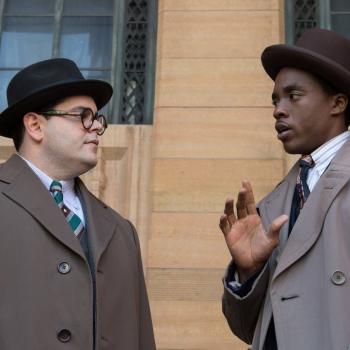Star Trek: The Next Generation became religious worship in my uncle’s home around when their oldest started high school and was unwilling to go to church. I had just moved back to the United States to go to graduate school in Long Island. Monthly, often fortnightly trips, to their house in Connecticut became my respite from the rigors of graduate school and relief from homesickness for family in India. It fit in with my needs – cuddled up next to two elementary-age girls who saw me as a big sister, being able to share in the underlying philosophy of each episode, without having to go into the complexity of being Hindu and yet part of a family that was primarily Christian. It also allowed me to go back to a time when I had no identity crises, no personal struggles, no financial challenges: when I watched the original Star Trek series as a child.
Star Trek symbolized a pioneering spirit, something I shared as an immigrant to the United States. William Shatner, reading the mission of the Starship Enterprise, “to seek out new life and new civilizations, and to boldly go where no one has gone before” expressed my dreams from childhood, and my experiences as a 20-something who had left home breaking traditional family expectations. But it was Spock, with his clear logic, splendid voice, and rational approach to dealing with his captain’s idiosyncrasies and the challenges that the crew had to face in each episode, who was my favorite. In later years, I bought the episodes on DVD and inducted my children and my husband into the philosophical and spiritual realms that the Starship Enterprise took us, seeking answers to other-wordly questions – and appreciated how Leonard Nimoy made the character unflappable: he showed you how to manage if life dealt you problems – you just took them on and kept going.
When the latest in the Star Trek movie series arrived, with Zachary Quinto as young Spock, it was still Leonard Nimoy who captured my attention. In Spock’s exchange with the younger version of himself, he speaks of an “act of faith” – one that he hopes the young Spock will repeat in the future.
Today, as I read about Leonard Nimoy’s death and reflections on his life, I became even more captivated. According to the NY Times, Mr. Nimoy “relished playing outsiders, and he developed what he later admitted was a mystical identification with Spock, the lone alien on the starship’s bridge,” and even wrote two autobiographies: “I Am Not Spock,” and “I Am Spock,” published respectively in 1977 and 1995. His haunting words speak of the duality of life, of the need to find balance – “In Spock, I finally found the best of both worlds: to be widely accepted in public approval and yet be able to continue to play the insulated alien through the Vulcan character.” I too seek the best of both worlds, and at once am an alien and accepted in each of them. I Am Not Spock, I am Spock. Leonard Nimoy, may you RIP, and may your memory LLAP.














